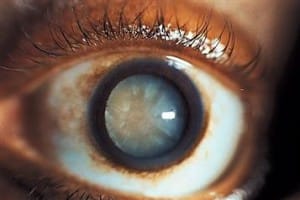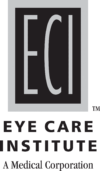
(© American Academy of Ophthalmology)
If you were to ask someone, “what are cataracts,” the most likely answer you’d get is cloudy vision. While clouded vision is the most well known of cataract symptoms, what concerns ophthalmologists about this eye disease is that they develop gradually, so a person may not notice changes in vision until cataract symptoms such as clouded vision have already manifested. To avoid reaching the point where cataracts have progressed in your eyes, ECI ophthalmologists recommend regular eye exams. This is because early detection and treatment of cataracts is critical to maintaining eye health.
To determine if you have cataracts, and to rule out any other eye problems that may be causing blurred vision, our ophthalmologists will give you a complete eye examination that includes dilating your eyes with eye drops and looking at your eye’s lens.
Cataract Symptoms*

(© American Academy of Ophthalmology)
It’s important to know all of the possible symptoms associated with cataracts. According to the American Academy of Ophthalmology (AAO), the following symptoms may indicate you are developing cataracts in one or both eyes:
- Painless cloudy, blurry or dim vision
- More difficulty seeing at night or in low light
- Sensitivity to light and glare
- Seeing halos around lights
- Faded or yellowed colors
- The need for brighter light for reading and other activities
- Frequent changes in eyeglass or contact lens prescription
- Double vision within one eye
Cataract Risk Factors*
At ECI we also recommend you schedule a baseline exam at age 40. Any and all subsequent followup exams will then be recommended by one of our ophthalmologists based on this initial eye exam.
However, if you experience any of the cataract symptoms listed above or you have been determined to be at risk for eye disease, contact ECI immediately. Please note that beginning at age 65 you should schedule a complete eye exam with your ophthalmologist every year. The risk factors for cataracts and other eye diseases increase as you get older.
The following risk factors increase your chance of developing cataracts:
- Advanced age
- Diabetes
- A family history of cataracts
- Extensive exposure to sunlight
- Smoking
- Obesity
- High blood pressure
- Previous eye injury or inflammation (swelling) in the eye
- Previous eye surgery
- Long-term use of steroid medication (especially combined use of oral and inhaled steroids)
If you have any of these risk factors for cataract, please schedule an appointment with one of our ophthalmologists at Eye Care Institute.
Further Reading
- American Academy of Ophthalmology Article: Cataract Symptoms
- American Academy of Ophthalmology Article: Cataract Risks
* Thank you to the AAO for this Eye MD-approved information.
